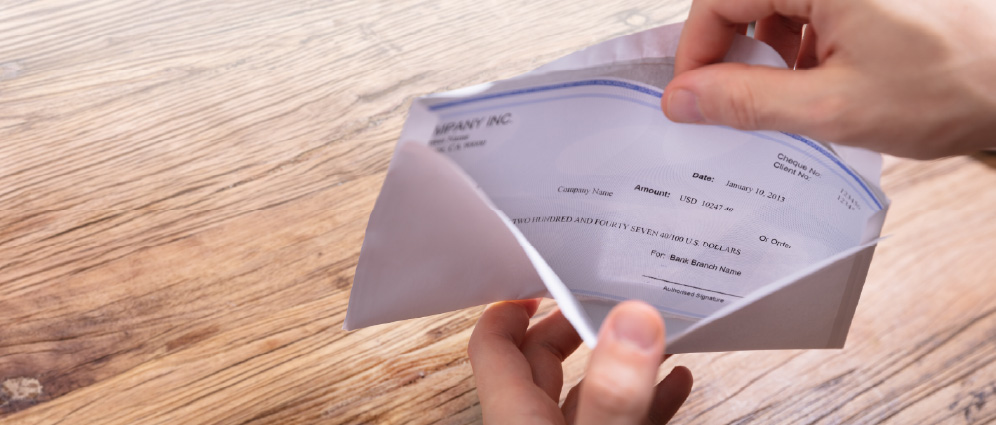Sign up for Fraud Alerts
Stay on top of credit and debit card fraud by opting into our SMS messages for fraud alerts.
LOGIN TO ENROLLNo Recent Searches Found
Did you mean:
Sorry, We couldn't find what you are looking for. It could be because of many reasons.

Banking has gone mostly contactless and digital, but sometimes we still choose the old checkbook to get business done or to pay a bill. And in a world where people still use checks, there can be check fraud.
There are many ways to commit check fraud — including altering, forging, or writing bad checks — but one particularly dangerous type of check fraud that never goes out of style is when a criminal tries to scam people by sending out fake checks in order to persuade targets to willingly fork over cash to them in return.
Read on to learn how to identify fraud before becoming a victim, and should the worst occur, DCU has tips to help you report it.
Please note, membership is required to open a DCU Checking Account. Visit our membership eligibility page for more information.
There are a variety of check fraud scams to have awareness of, including:
The fake check approach is always popular and unlikely to go away for as long as checks exist. This is because it’s a simple and effective crime to pull off. All a fraudster needs is a decent printer and a scanner to draft a check that can pass as real. Some fraudsters even take it to another level, using watermarks, or even checks using real checking account information they’ve stolen from another target.
Fake checks can be hard to spot, even if you know what you’re looking for. Due to advances in technology, producing counterfeit checks has gotten easier and they’re harder to identify. However, there are a few things to look for that can help to identify a fake check. They include:
The MICR is often key to identifying a bad check. For valid checks, the line will be smooth, without raised or shiny numbering.
If it looks like a scam, it almost always is one. But that doesn’t mean you need to become a victim. According to the Federal Trade Commission (FTC), the three main ways to avoid becoming a victim of a check fraud scam are:
As a general rule, don’t ever accept checks written for more than the price of something you’re selling. If the buyer says it was an accident, force them to void their old check, and to write a new one in the correct amount. Otherwise, encourage them to pay using a reputable peer-to-peer mobile payment app like PayPal or Venmo.
View this resource to learn more about the types of check fraud and how to prevent it.
If you fall victim to a check fraud scam, report it to the appropriate authorities, and your bank or credit union. DCU members should call 800.328.8797 immediately to speak with a fraud expert. For legal authorities, report fake checks to the United States Postal Inspection Service. Counterfeit checks should be reported to the Federal Trade Commission.
In the event of check fraud, it’s also possible criminals have done more than steal money from you. Monitor your credit and online accounts to confirm whether your personal information or your identity have been compromised. With some extra vigilance, you have nothing to lose but a little time.
Does the idea of writing and cashing checks have you nervous all of a sudden? DCU makes it easy to go digital and write fewer, if any, checks. The more you pay online using a secure website and internet connection, the less at risk you are for check fraud. DCU even has a mobile app making it easy to bank safely from everywhere.
Learn more about fraud prevention with a range of articles, videos, and other resources available in our Financial Education Center. If you aren’t already banking with DCU, consider applying to become a valued DCU member to enjoy all our not-for-profit credit union has to offer.
Federally insured by NCUA.
This article is for informational purposes only. It is not intended to serve as legal, financial, investment or tax advice or indicate that a specific DCU product or service is right for you. For specific advice about your unique circumstances, you may wish to consult a financial professional.